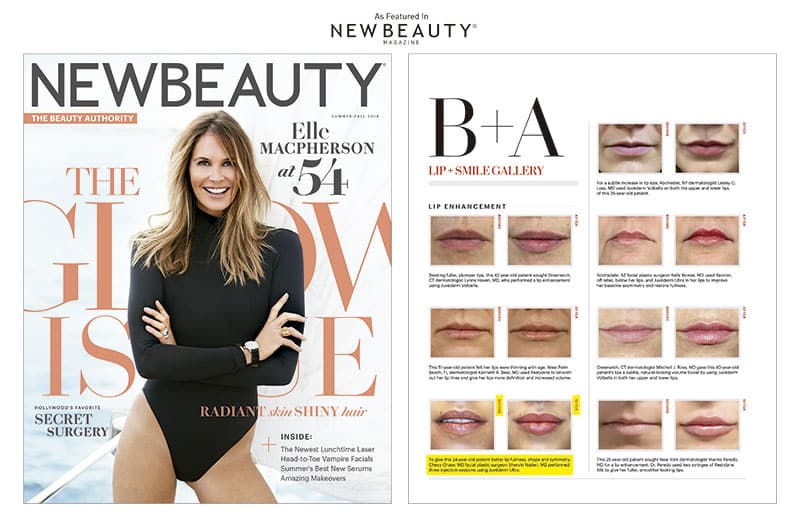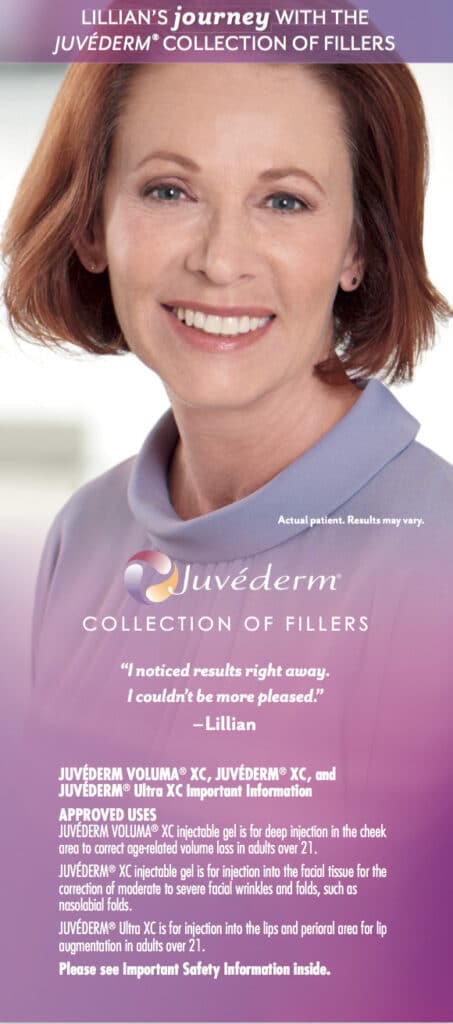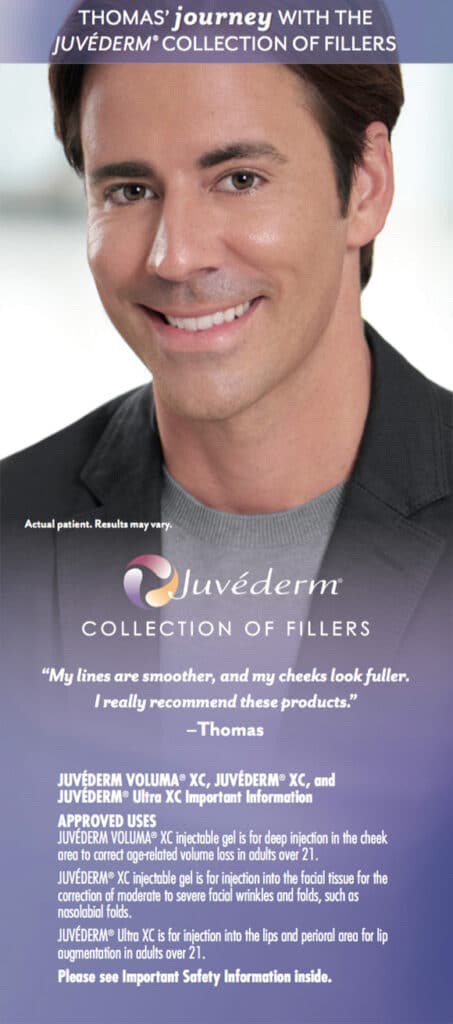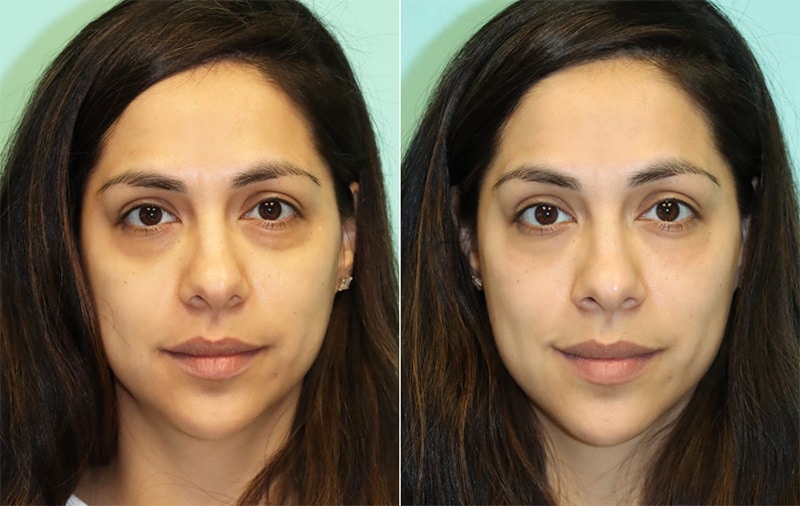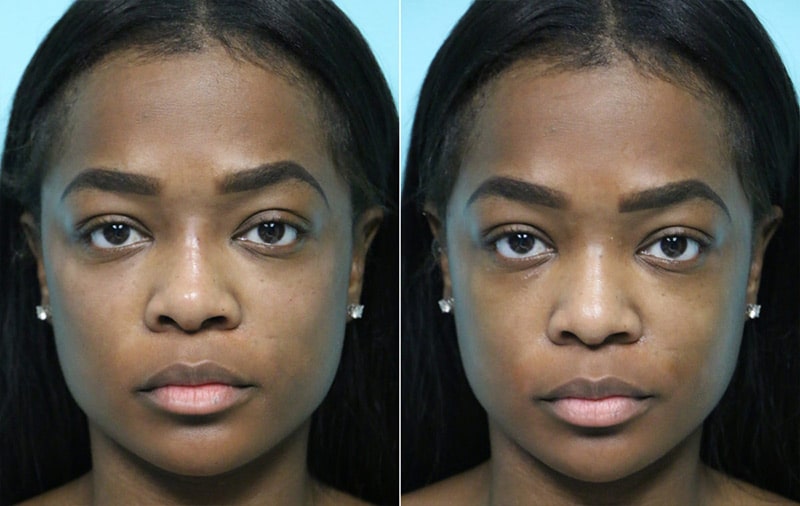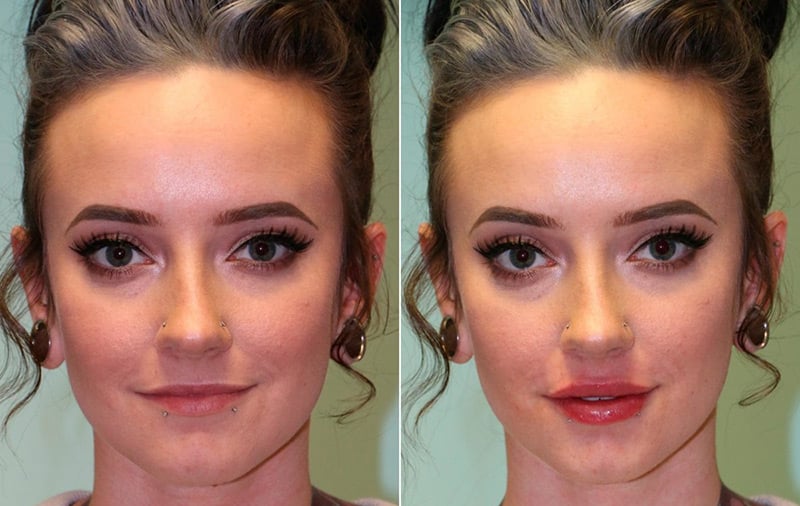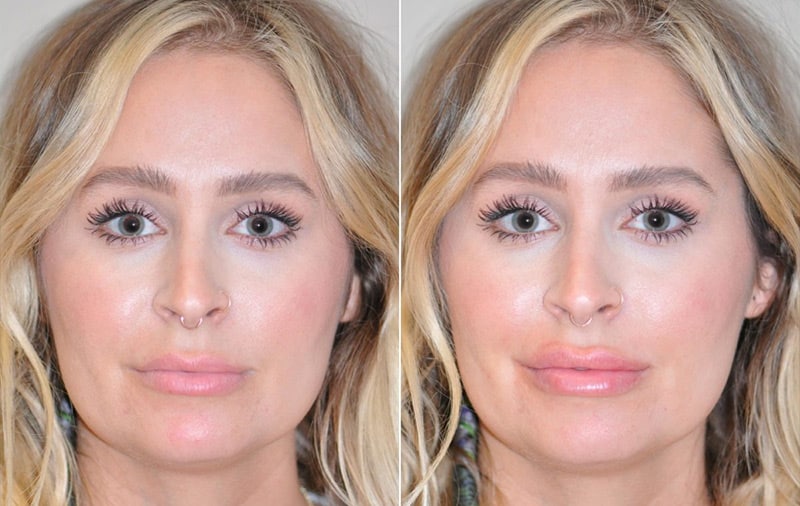Filler Injections in Virginia, Washington D.C. and Maryland.
Want a fresher, more youthful look without surgery? Filler injections at The Naderi Center in Virginia can help smooth fine lines, restore lost volume, and lift areas that have started to sag. Our skilled team uses trusted dermal fillers to give you natural-looking results—never overdone. It’s quick, precise, and designed to help you feel like your best self again.
Embark on a journey of aesthetic excellence with The Naderi Center. Experience unparalleled artistry and precision for transformative beauty.
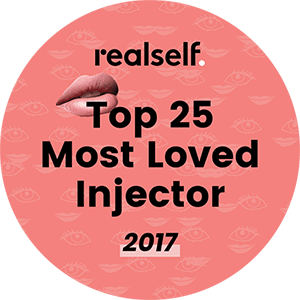
Filler Injections Benefits for Smooth Skin
Unveil the captivating benefits of Filler Injections—a revolutionary solution to combat the effects of time gracefully. These injections offer a non-surgical approach to smooth away fine lines, enhance facial contours, and rejuvenate your appearance.
Youthful Radiance
Turn back the clock and embrace a more youthful, revitalized look as Filler Injections replenish lost volume and reduce wrinkles.
Instant Results
Experience a rapid transformation with minimal downtime, as Filler Injections provide immediate, natural-looking enhancements.
Confidence Boost
Say hello to newfound self-assurance as your refreshed, radiant appearance becomes a source of pride and confidence.


Filler Injections Overview
The latest, most exciting cosmetic surgery advancement is the abundance and variety of injectable fillers. Dermal fillers are injected under the skin and restore lost volume and softness, easing the wrinkles and filling sunken areas and creases. Injectable fillers can be used for many different cosmetic treatments, even a non-surgical face lift. Fillers can smooth wrinkles, plump out cheeks, erase pitted scars, fill out the lips and more. How well the filler solves your chosen problem depends on the expertise of your plastic surgeon.
Some dermal fillers attract water to plump up the skin; other fillers stimulate the formation of the body’s collagen to keep the face looking younger longer. Each filler has unique properties and uses. Some have short term rejuvenating properties, lasting a few months, and others may provide benefits for years.
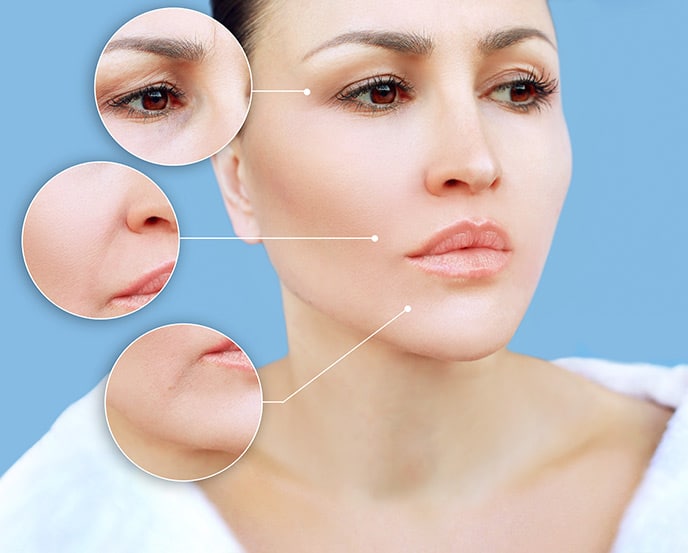
Expected Results with Dermal Fillers
- Smoothen out fine and deep lines on the face
- Plumped appearance to once sunken cheeks or temples
- Improved appearance of lip lines
- Enhanced lip volume and shape
- Reshaped nose
- Smoothen chin crease
- Better overall symmetry in the face
- Decreased shadowing or hollowness underneath the eyes
- Filled in depressed scars
Ideal Candidates for Dermal Fillers
Good candidates for dermal fillers
- Desire to reduce wrinkles or lines on the face (laugh lines, smile lines, nasolabial folds, smoker’s lines, etc.).
- Want to add volume to the lips.
- Have lost lost volume to the cheeks, or around the eyes.
- Desire to re-shape the nose, jaw-line, chin, or cheek bones, but do not want to undergo surgery.
- Have depressed facial scars or acne scars.
- Want to add volume to other parts of the body such as the hands.
Types of Dermal Fillers
Dermal fillers come in a variety of materials and by numerous companies. The oldest dermal fillers were Collagen based (Cosmoderm, Cosmoplast, Zyderm, Zyplast, Evolence, etc.). Cow collagen (bovine), pig collagen (porcine), as well as human collagen were widely used in the 1980s and 1990s. After 2000, Hyaluronic acid also known as “HA fillers” (Captique, Hylaform, Restylane, Perlane, Juvederm, Belotero) became more popular. A variety of substances are FDA approved to be used as dermal fillers. Always ask the name of your dermal filler and make sure that it is an FDA approved product.
Hyaluronic Acid (HA)
Hyaluronic acid based fillers are the most natural feeling and looking substances. Hyaluronic acid is found naturally in the body, thus, HA fillers can be safely injected into the skin. Similar to collagen. Hyaluronic acid fillers usually do not require allergy testing while collagen fillers often did require allergy testing. Hyaluronic acid helps to create volume and fullness underneath the skin. Most HA fillers are a clear substance that feels soft and gel-like. The main difference between the different types of hyaluronic acid fillers is their viscosity and cross-linking. A skilled and experienced medical provider will know which types of fillers are intended for unique injection locations. Hyaluronic acid fillers can be expected to last anywhere from 6 to 12 months before the body starts to break down the molecules. Hyaluronic acid fillers are also mostly dissolvable and can be removed with an injectable enzyme known as Hyaluronidase (Wydase, Hydase, Vitrase). Today’s HA fillers are packaged in 0.5 mL or 1 mL syringes and contain lidocaine, a numbing medication that helps minimize discomfort during the injection.
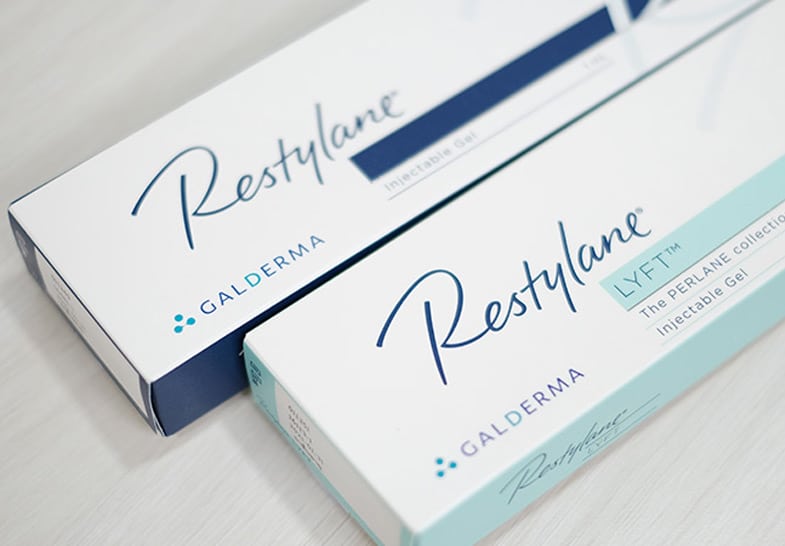
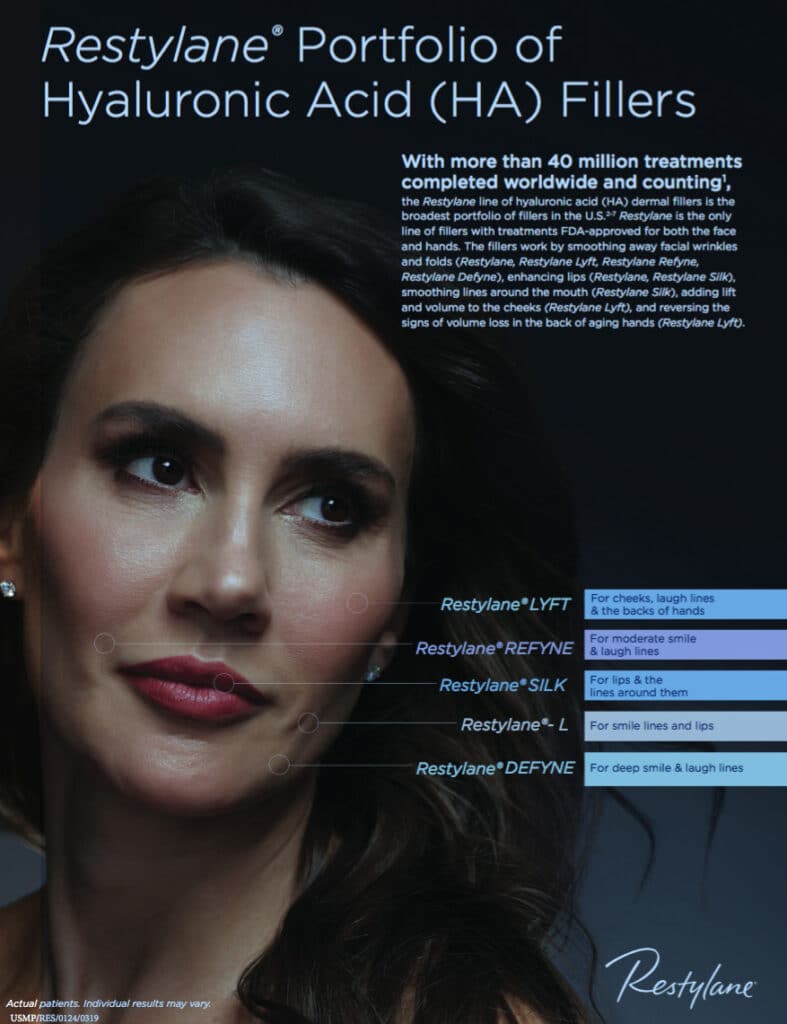
Calcium Hydroxylapatite (CaHA)
Calcium hydroxylapatite is a substance that is naturally found in bones and is a commonly used dermal filler. Calcium hydroxyapatite fillers consist of tiny calcium particles that are dissolved into a smooth white gel. CaHA fillers are thicker in consistency and usually a larger caliber needle is used to inject the filler. One advantage to calcium hydroxyapatite fillers is that they usually longer than hyaluronic acid fillers, most patients can go 12 months without needing a repeat injection. Currently the only CaHA filler approved by the FDA is Radisse®.
Poly-L-lactic Acid
Poly-L-lactic acid fillers are synthetic substances that have been shown to be safe to inject into the body. Historically Poly-L-lactic acid products have been used for other medical purposes such as for sutures for surgery. Although initial injection of Poly-L-lactic acid fillers adds volume to the skin and helps to smoothen deep and fine lines, it is the collagen stimulating effects that are long lasting. Poly-L-lactic acid fillers awaken the body’s natural collagen stimulating cells, known as fibroblasts, to start making collagen fibers. Usually multiple injection sessions are necessary and full results are not appreciated until months after treatment. However, results are longer lasting with Poly-L-lactic acid fillers, and patients needs occasional touch-ups every few years to maintain their results. Galderma’s Sculptra® Aesthetic is currently the only FDA approved Poly-L-lactic acid filler on the market today.
Polymethylmethacrylate (PMMA)
Polymethylmethacrylate (PMMA) is a man made or synthetic substance that is safe to use as a dermal filler. PMMA consists of tiny spheres or “microspheres” that are injected underneath the skin to add volume and reduce the appearance of deep lines and wrinkles. Usually these fillers also contain some collagen in their formulation, however the collagen biocompasses and the PMMA is the sole product left in the skin. The only FDA approved PMMA filler is Bellafill®, that was formerly known as Artefill.
Collagen
Collagen, is found throughout the body, specifically, its loss in the face leads to signs of aging and loss of a youthful appearance. There currently exist a number of FDA approved collagen based dermal fillers which include Cosmoderm®, Cosmoplast®, Zyderm® and Zyplast®. The collagen based fillers can last up to six months.
Fat grafting or autologous fat injections
Fat grafting is a technique that involves removing a patient’s own fat and injected into another area of the body. Fat injections are a more permanent solution to creating facial volume, especially for patients that do not want to or can not commit to repeat injections 2-3 times a year. Fat injections should only be performed by a board certified body or facial plastic surgeon that has trained extensively in facial and bodily anatomy.
Testimonial
“I’ve seen Dr. Naderi for surgery and injectables. He is extremely skilled and knowledgeable. I trust him completely with my face! His staff is always friendly and professional. He is hard to get into see but that’s also a testament to how in demand he is.”
Treatment areas for filler injections
Dermal fillers can be used for a variety of concerns. Depending on the treatment area, your medical provider will recommend the appropriate type of filler.
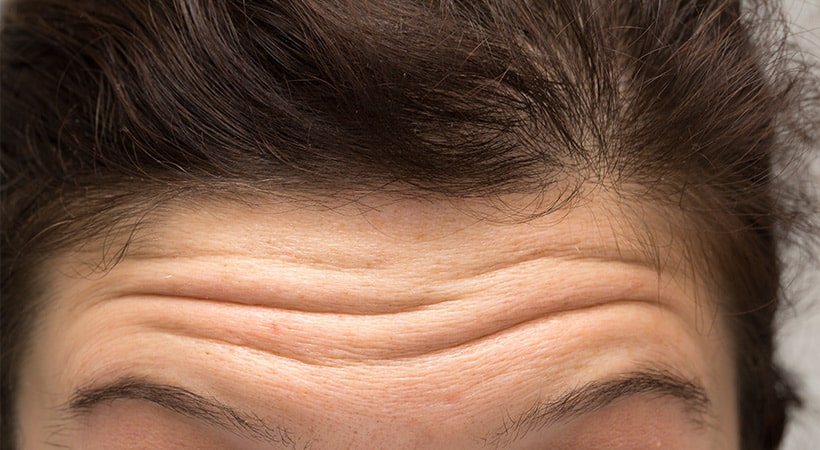
Deep Forehead Crevices
Deep horizontal forehead lines are purely due to the heaviness of the upper eyelid and brows most commonly from aging and the subsequent unconscious elevation of the brows to keep the eyes more open. Treating deep forehead lines involves a combination of dermal fillers with Botox.
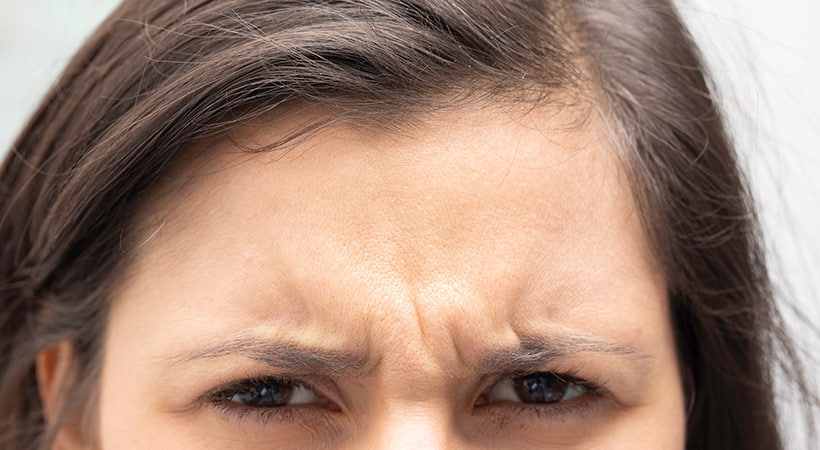
Frown Lines
Frown lines or the “eleven-lines” between the eyebrows are due to frowning, squinting, or even sleeping on the side of ones face. Successful treatment of frown lines involves primarily Botox to relax the corrugator muscles creating these lines, but in more advanced cases dermal fillers are necessary to improve the lines appearance at rest. This is a very complex area for filler injection and should be only done by expert plastic surgeons and dermatologists who are aware of the local facial anatomy.
Temple Hollowness
Temples are the areas on the side of the forehead that can begin to hollow with age, creating a “pinched” look to the upper portion of the face. For some individuals, who otherwise appear youthful, this may be the only sign of facial aging. Fillers, as well as autologous fat injections can be used to fill in the temple region and create more facial width to the upper face.
Tear Troughs
Tear troughs are the medical term referred to as the area under the eyes. Tear trough deformities result in a hollowed-out and sunken appearance of the eyes, which results in a the formation of a dark shadow over the lower eyelid. Individuals with tear trough deformities may appear tired and fatigued despite the fact that they may be getting plenty of rest. Sometimes these dark circles can be corrected with use of a small amount of concealer, however dermal fillers may provide a more long term solution. The best candidates for tear trough injections are younger patients with thicker skin and minimal to moderate hollowness in the area. In some cases if an individual has the appearance of “sunken bags” underneath the eyes, a lower blepharoplasty may be the only solution and they should not waste any money on tear trough injections.
Cheeks
Cheek injections can be done for a number of reasons. For younger individuals, cheek injections are used to increase facial cheek bone facial contour. For patients of older age that have lost a significant amount of collagen and fat in their face, cheek injections help to restore youthfulness. Cheek injections help to restore cheek volume where it once existed as well as to help lift deep “laugh lines” or nasolabial folds.
Nose or Non-surgical Rhinoplasty
Non-surgical rhinoplasty or nose injections, can be used to straighten nasal humps, increase nasal bridge height, “slim” the appearance of the nose and reshape the nasal tip. Dermal filler is injected just underneath the skin and results can be expected to last from 6 – 12 months. Not everyone is a candidate for a non-surgical rhinoplasty, especially in cases where someone is seeking to achieve a small nose. In certain cases patients may undergo a non-surgical rhinoplasty if they are not ready for surgery or want to see how they feel about changing the appearance to their nose.
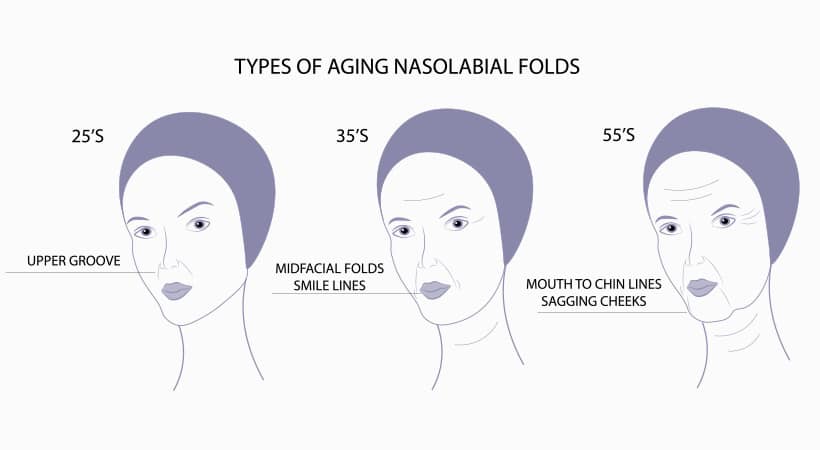
Nasolabial Folds or Laugh Lines
Nasolabial folds are the deep lines around both sides of the mouth and become more evident when smiling. Just about everyone has nasolabial folds except for babies. Nasolabial folds are not a sign of aging, however, they become more prominent with age and loss of facial collagen and fat volume, especially around the cheeks. Patients often feel that filler injection into the nasolabial folds may improve their appearance, however, overfilling this area can cause the face to appear forward protruding and give the “Homer Simpson” look. Our physicians are extremely careful in placement of fillers and may recommend treating the “mid-face” or cheek area instead, in order to “lift” the folds and hence diminish their appearance.
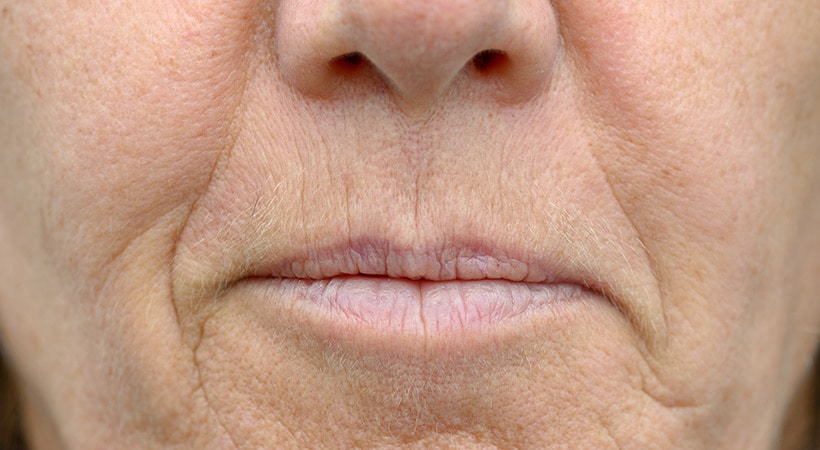
Marionette Lines and Oral Commisures
Marionette lines or oral commissures get their name from the marionette string-puppet that has a split jaw, making it easy for a puppeteer to open and close their mouth to give the appearance that the puppet is talking. As we age, gravity, and loss of elasticity starts to pull the face in a downward direction. Some individuals form a line that runs from the outer corners of the lips towards the chin, resembling the same line seen on a marionette puppet. These oral commissures may make someone appear angry or sad. A large part of whether you form this line is hereditary, however, dermal fillers can significantly reduce the appearance of marionette lines.
Lips Augmentation
Lip injections are one of the fast growing noninvasive cosmetic procedures currently being performed. Thanks to the popularity of Hollywood stars like Kylie Jenner and Kim Kardashian, the demand for lip injections has increased significantly in the last ten years. Lip injections can be performed to enhance lip volume, alter lip shape, and to correct lip asymmetries and lines. Ideally the upper lip should be 2/3 of the volume seen in the lower lip. Lip injections can be subtle as well as very voluminous and full. Lip injections should be performed incrementally and conservatively to ensure that the lips are slowly modified into their new size and shape. Correcting lip size and shape too quickly can result in the dreaded “duck” lips or “fish” lips, which no one likes. The best lip injections, whether subtle or large, always fit the face of the individual.
Jaw Line Contouring and Jowls
Jaw line contouring or filler injections around the jaw line, are commonly sought out by both young and older women and men. By adding a small amount of filler along the jawline, better contoured “Angelina Jolie-like” jawline definition can be achieved. Dermal fillers can help men achieve a stronger more masculine jawline, creating a more square shaped face. Additionally, aging causes loss of bone mass and collagen which distorts the jawline angle and eventually leads to the formation of jowls. Filler injections around the pre-jowl sulcus can help blend the jowl with the chin to contour and lessen the appearance of the jowls.
Chin Wrinkles and Chin Augmentation
Chin injections can be performed for a number reasons, both to smoothen chin wrinkles as well as to treat a recessed chin. For some patients chin augmentation with fillers helps to create a better proportioned face. Chin size can affect overall shape of the face, with a short chin creating a more rounded face and a strong chin creating a more oval shaped face. For men, a more angulated chin can be perceived as more masculine and desirable. For patients desiring a more prominent chin and contoured jaw line, but not wanting to pursue surgical chin implant option, dermal fillers are a great option.
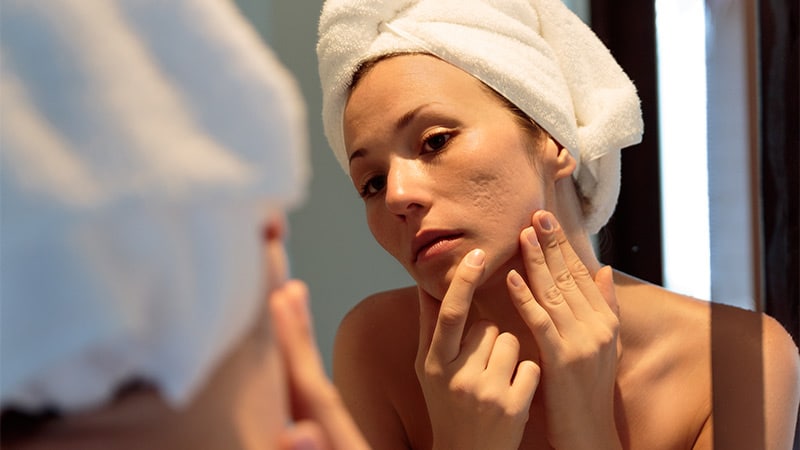
Acne Scars
Acne scars are depressions left within the skin from previous acne breakouts. Acne scar depressions can be treated with fillers and help to smoothen overall skin texture.
Earlobes
Body
Dermal fillers can be used to rejuvenate non-facial body parts such as backs of hands, balls of feet, female genitals, depressions and divides as a results of previous liposuction and scars and buttock enhancement.
Filler Injection Techniques
Training, experience, and expertise are all vital parts in not only making sure injection results are natural and beautiful, but more importantly, to ensure your safety and minimize risk of complications. Most people are not aware that even in the most experienced hands, filler injections can inadvertently be injected into local blood vessels and cause occlusion of those vessels. Occlusion of blood vessels can prevent blood flow to that area of the body. Consequently, if not treated quickly and effectively, this can cause necrosis or death of that part of the body. This is why many people feel comfortable going to a medspa or their local injector for Botox, but when it comes to filler they seek a board certified plastic surgeon or dermatologist.
The following table outlines the different injection techniques that can be performed with fillers.
| INJECTION TECHNIQUE | DESCRIPTION |
|---|---|
| Fern Pattern | Injection of very small amounts of filler in a leaf-shaped pattern into dynamic facial lines. |
| Linear Threading | The full length of the needle is inserted into the injection location and filler is injected in a straight pattern as the needle is slowly withdrawn. “Threads” refers to the lines of filler that are deposited into the fold and wrinkles. |
| Serial Puncture or “microdroplet” | Injection deposits of extremely small amounts of fillers placed at injection sites very close to each other. |
| Fanning | Similar to linear threading technique, except that needles direction is changed immediately before the needle is about to exit the skin and a new line of filler is injected. |
| Cross-Hatching | Threading technique creating a series of lines parallel to each other and then crossing it with a series of perpendicular lines. |
| Depot | Small deposits of filler are placed serially into the treatment area. |
| Cone/Tower | Needle is inserted perpendicular into the skin until bone is reached, filler is deposited in the shape of a pyramid, more filler being deposited closer to bone than skin. |
Cannula Method vs. Sharp Tip Needle Injection Method
Cannulas are hollow bore needles that have a rounded, blunt end that enters the skin. Because cannulas are less sharp they have a lower chance of hitting small vessels during injection of fillers. Cannulas also allow for an injector to deposit filler without as many needle “pokes” in the skin.
The benefits of cannula method for filler injection include:
- Decreased risk of bruising and bleeding
- Less pain with injections due to decreased needle sticks
- Reduced incidence of vascular occlusion causing tissue death
- Reduced downtime and recovery due to less bruising and swelling
There are certain injection types that are better suited with the traditional sharp needle method. Areas where a very small amount of filler is needed to create the desired effect would not be suited for cannula technique. For example filling in acne scars or fine lines, touchup injections, small area injections such as creating a “cupid’s bow” on the upper lip would be better suited with cannula technique. Additionally, highly skilled injectors often times prefer a sharp needle method, especially when doing a micro-droplet technique. Sharp needle technique with micro-droplet delivery of filler will always have the most precise and accurate placement of dermal filler and is the preferred method at The Naderi Center.
Pricing of Dermal Fillers
Preparing for Dermal Filler Injections
Proper dermal filler preparation is important when it comes to minimizing recovery and increasing safety of injections. Prior to your appointment it is important to be off of certain supplements and medications as well as to minimize consumption of certain foods that are high in Omega-3 and Omega 6. All of our patients are advised to view our list of “Things to Avoid” prior to injections or surgery.
2 Weeks Before Dermal Fillers Injections
Follow our dietary restrictions
For 2 weeks before your appointment avoid nuts, seeds, fish, fish oil, NSAIDs, supplements, and anything that prolongs bleeding. This will significantly help minimize bruising, bleeding, and swelling after your injections.
Arnica Supplements
You can start Arnica supplements a week prior to injection to help with post injection bruises. Arica helps to speed up the fading away of bruises. Arnica supplements can be found in most health supplement isles at your Whole Foods, GMC or CVS, as well as purchased from The Naderi Center.
Stopping Medications and Supplements
Talk to your primary care doctor or physician specialist. If you are on blood thinners you may need to stop these a few days to weeks prior to your injection treatment. Speak to your prescribing physician regarding if it is safe to stop these medications as well as to obtain instructions about when to stop and restart the medication. We do not recommend patients that are on life saving medications stop their medications in order to have any cosmetic procedures performed.
Prevention of Cold Stores
Patients prone to cold sores will need to start a prophylaxis dose of an anti-viral medication prior to their injection treatment. Your physician provider will prescribe this medication prior to your treatment.
Familiarize yourself with Risks and Benefits
Read our filler consent prior to your visit to familiarize yourself with risks and benefits of filler injections.
Day of Dermal Fillers Injections
Eat and drink before your treatment
It is not uncommon for patients to “pass-out” or get “vasovagal” during their injection. Most people are not fond of needles. Having a good blood sugar and being hydrated will make it less likely that you will feel queasy during your treatment.
Minimize make up and lotions
Please minimize make-up, especially in and around areas where you would like to get injections performed. Our medical assistants will have to remove your make-up prior to the procedure. You can bring make up with you and apply it immediately after your treatment.
Come in 30 minutes prior to appointment time for numbing
We recommend numbing crème application prior to dermal filler injections. The numbing cream needs a good 20 – 30 minutes to exert its full effect, hence we ask all our filler injection patients to come a little earlier to allow for the numbing time.
Reserve your next appointment
We love our loyal patients, and making sure that we can see you when you need your next injection is important to us. Most of our physicians book out 3 – 4 months and we prefer to never double book patients. We always recommend that you schedule your next appointment before leaving.
Recovery after Filler Injection
After your filler injection it is normal to have some swelling, pinpoint bleeding, and bruising. If numbing cream was applied for your procedure you will still feel numb for another 1-2 hours after your procedure. Please be sure to follow our post procedure instructions in order to minimize swelling, bruising, and decrease downtime.
Ice, Ice, Ice
Use a small bag of frozen peas in a sandwich bag or crushed ice to gently ice the area. No heavy ice bags. Ice for 20 minutes on and 20 minutes off. Continue the icing for 48 hours if possible.
Minimize Strenuous Exercise
We recommend no strenuous exercise for 48 hours in order to reduce swelling and bruising.
Do not manipulate or massage or rub or poke the area
Unless specifically advised by your physician, do not massage or manipulate your face. For one week avoid facials or rough scrubbing of the face. You can wash your face gently.
Use make-up and concealer to cover up bruises
You can use makeup and concealer the day of your injections to cover up any bruising.
Non-surgical rhinoplasty patients should avoid glasses if they “dig into” the injection region
Bring your glasses to your appointment to show our providers at The Naderi Center if they would be appropriate to wear after non-surgical rhinoplasty. Additionally, if you are an avid swimmer, mention the use of swim goggles during your consultation.
Take Arnica supplements
Arnica supplements can quickly help reduce appearance of bruises.
Eat pineapples and drink pineapple juice
Pineapples have an natural anti-inflammatory properties to them that help to minimize swelling after injections.
Do not over-evaluate your face the first two weeks
The first two weeks after injections it is normal to have bruises, swelling, and be asymmetric. We recommend waiting two weeks for swelling and bruising to be completely gone before you can appreciate your final results.
Take Tylenol for Pain
It is normal to experience some pain and sensitivity in the area of the injection. Most patients find that Tylenol can help relieve this post-injection pain. Avoid NSAIDs such as Motrin and ibuprofen as these can make swelling and bruising worse.
How long will my filler last?
Hyaluronic acid filler molecules can last up to 18 months in certain areas of the face. However the visible effects of the fillers, to the naked eye, can last a shorter period. HA fillers last a shorter time in more dynamic and mobile areas such as lips but last longer in less mobile areas such as the lower eyelid tear troughs or the nose.
“FULL CORRECTION” is an important concept in longevity of the filler results. Full correction refers to fully correcting the problem with the necessary amount of filler. For example, for deep nasolabial folds or smile lines, 2 to 3 syringes of Restylane may be required for the best results or “full correction.”
However, if a patient chooses to only use 1 syringe, optimal results will not be reached. While the filler material injected may be present for up to a year or more, the “visible results” may not be appreciated for more than just a few days! This phenomenon occurs because immediately after the injection, the patient visibly notices the “improvement” but after a few days when the initial swelling settles down, the patient will rightly think he or she needs more volume, and wrongly think “the Restylane must have all been absorbed.” Patients often forgot the starting point and how deep the lines were in the first place.
These types of problems exist when the full amount of necessary volume is not injected in the first place. This is why “full correction” is so important. At The Naderi Center we pride ourselves in educating each patient on how to reach their best results with injectables. This is part of our consultation process.
Risks, Safety, and Potential Complications of Dermal Fillers
Common and expected side effects of dermal filler injections include the following:
Bruising
- May last 1-2 weeks but bad bruises can last up to 4 weeks. That is not abnormal. Bruises can show up several days after the treatment.
- Bruising can be covered with a full coverage concealer such as Neostrata, which we sell in the office, or the Cover Fx brand from Sephora.
- Tear troughs and lips are more likely to bruise because these areas are more vascular than other parts of the face.
Swelling
- May not always be even from side to side depending on pre-existing facial asymmetry and volume of injection and bleeding at each injection site.
- Initial swelling takes 2 weeks to settle.
- Sleeping propped up and icing can minimize this side effect.
- Avoid exercise first 48 hours or longer as swelling increases when working out.
- Do not manipulate or massage area as this can aggravate swelling.
Asymmetry
- Asymmetry can be related to swelling. Give it 2 weeks and before deciding whether asymmetry is from filler volume differences or swelling.
- Please keep in mind that once you start to analyze your face it is not rare to start to “notice” new asymmetries that have been there your entire life.
Lumps And Bumps
- The filler is going to feel firmer than your own tissue. Do not massage or manipulate the area.
- The feeling of lumps and bumps usually improves within 2 weeks as swelling resolves.
Subtle Results
- 1 syringe of filler is the equivalent of 1/5th of a teaspoon in volume. After swelling subsides, there may be a need for additional filler injections if you desire increased volume.
- Our doctors are very conservative and do not over inject patients. Our physicians prefer to add volume slowly with time to achieve the desired look.
- The first time getting injections the results tend to go away faster. With repeat treatments, results last longer as you build your own collagen around the injection sites.
Possible Complications After Dermal Filler Injections
- Hypersensitivity or allergic reactions
- Cold sore or herpes simplex virus outbreak
- Acne breakout
- Skin necrosis
- Intra-vascular injection leading to skin necrosis and even blindness
- Sterile abscess
Dry Lips
- Lips will also be more dry post injections. Ice the areas and keep lips lubricated with Vaseline or Aquaphor. No more than 20 minutes of ice at a time.
Please notify our office immediately if you feel that you may be experiencing any of the above possible complications after your filler injections.
How often do I need to repeat injections?
Repeat injections of dermal fillers are needed to maintain or improve results.
Factors affecting how often injections need to be repeated
- Filler type
- Volume previously injected
- Area on face injected
Juvederm Ultra Plus and Perlane tend to last longer than Restylane or Juvederm Ultra. Belotero lasts less than the other HA fillers. These effects are due to the actual Hyaluronic acid concentration in each syringe of dermal filler as well as their “cross linking” or “bonding pattern.” The more concentrated and the more cross-linked, the longer they last. However, there are distinct differences and advantages as well as disadvantages with each of these fillers.
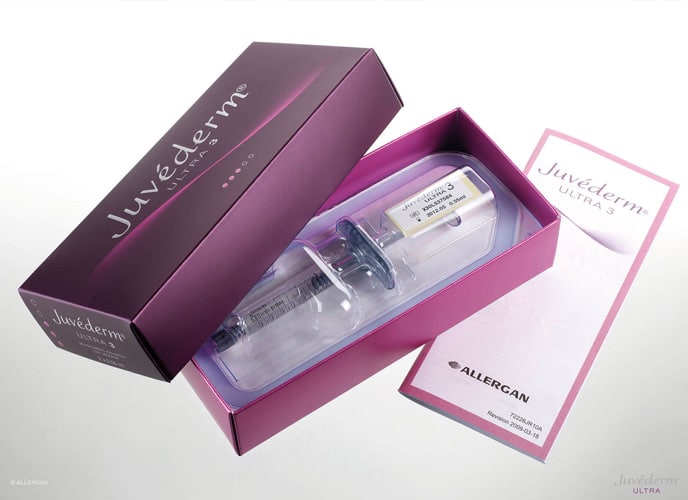
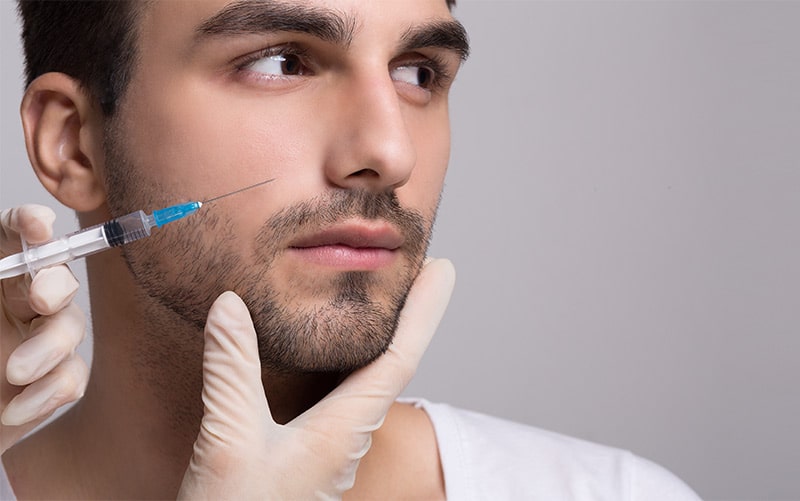
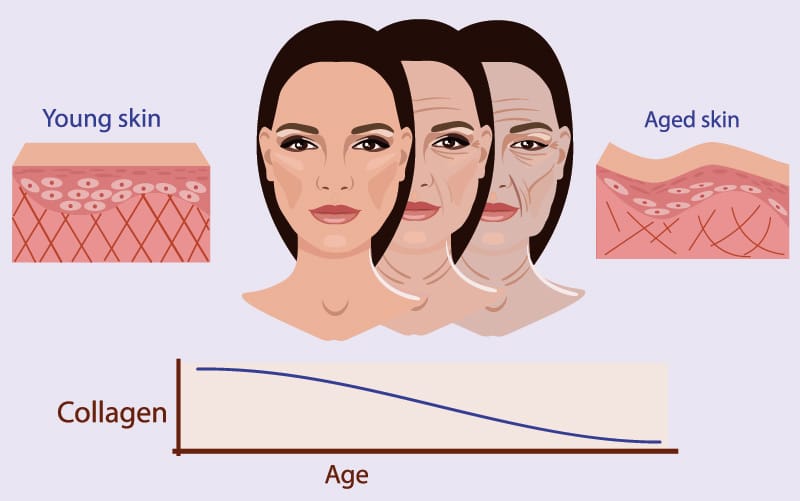
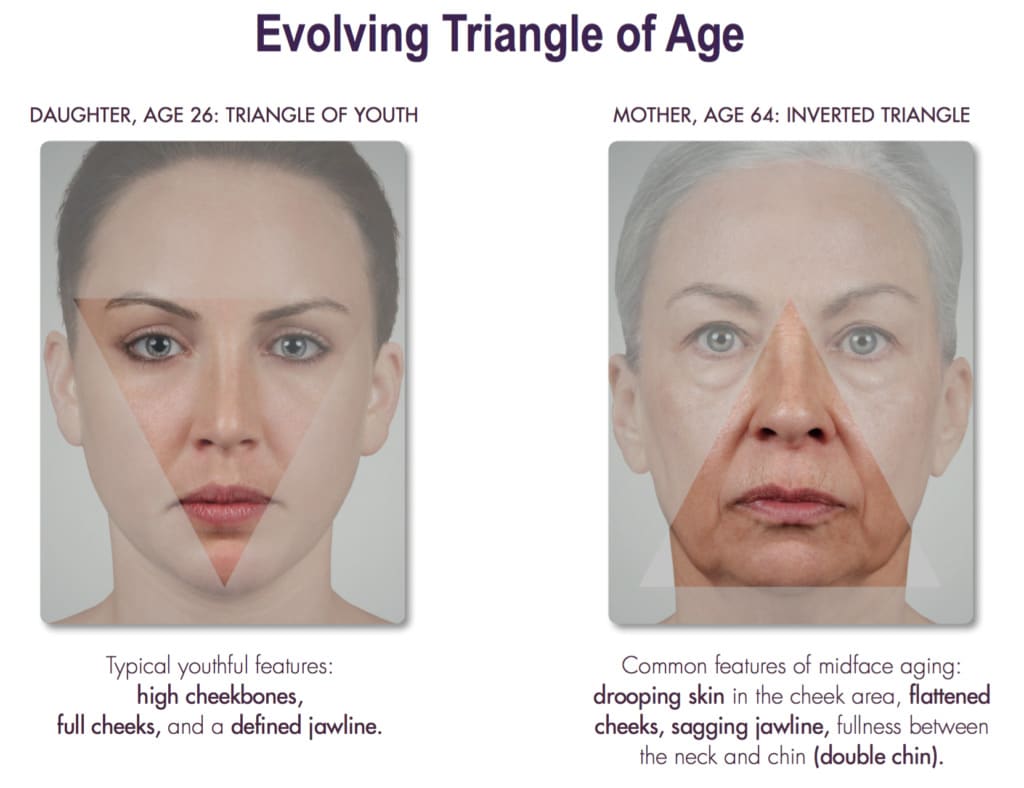
Aging is also a process where volume is lost from the face including the fat, muscle, and bones. Gravity pulls down the deflated area creating sagging. This aging process ends up creating a more rectangular face whereas a youthful face is characterized by an upside-down triangle shape. Using fat, facial implants, or more commonly today, dermal fillers, lost volume can be added to the face to create a more natural rejuvenated look without surgery.
RealSelf Most Loved Injector Awards: 2017 Winners Announced, according to patients
Dr. Naderi is a board certified facial plastic surgeon and a National Clinical Trainer for Allergan and Medicis. He teaches other doctors how to inject Juvederm, Restylane, and Perlane properly. Other doctors from all over the world refer to Dr. Naderi’s instructional videos on YouTube to fine tune and improve their own filler injection techniques.
Dr. Alexandra Snodgrass is a board certified dermatologist who trained with Dr. Shervin Naderi prior to joining The Naderi Center. Dr. Snodgrass is expert on a variety of filler types and injection area techniques. Dr. Snodgrass’s dermal filler injections create a noticeable yet natural rejuvenation of the face.
Specialization Matters! SM
Dr. Shervin Naderi was just named “Top 25 Injector” by the 10 million member community of RealSelf. Out of 2000 nominees, Dr. Naderi was chosen as Top 25! This is a huge honor being recognized by the national and international community of RealSelf, the most trusted and authoritative site for all unbiased plastic surgery research.
Dr. Naderi is one of only 4 winners in the South East region of the United States. His patients who regularly fly and drive to The Naderi Center from all over the country already know how great he is for his unique style of Botox and Filler injections. Doctors all over the world regularly use his online tutorial videos to learn and enhance their own technique and have always respected Dr. Naderi’s injection skills.
Contact us to schedule a consultation for dermal filler injection with one of our specialists at The Naderi Center. We are located in the greater Washington DC area with two locations, Chevy Chase, Maryland, 301-222-2020 or Reston, Virginia, 703-481-0002. For out of town patients we offer virtual consultation prior to your visit which can be arranged by filling out our contact us form.
Dermal Fillers FAQs
What are the limitations of dermal fillers?
Fillers simply “fill” or add volume. If addition of volume fixes the problem then fillers are the answer. But in some cases “dynamic wrinkles,” or wrinkles that get worse with expression or movement, need to be treated with Botox or Dysport. The wrinkles that are already present at rest known as “static wrinkles” can be improved with Restylane, Perlane, Juvederm, Belotero as long as the wrinkles or lines are not extremely superficial.
Lines or wrinkles that are extremely superficial need additional procedures such as CO2 laser chemical peels or dermabrasion. Addition of fillers to very superficial lines may create a lump in the area. Also some lines may not be present at rest but show up with expression. Addition of fillers to these lines in order to improve their appearance during expressions or movement may result in lumps appearing at rest.
How can dermal fillers be used for men?
More men are coming in for facial cosmetic procedures than ever before. The key in treating men is thorough understanding of the facial anatomy so that fillers are added to the proper locations to maintain a masculine and natural appearance. While feminization procedures are possible especially for transgender patients, the vast majority of men want to maintain a natural masculine appearance.
For example, while Juvederm Ultra Plus or Perlane is added to women to create sexy high cheekbones, in men, the same fillers are added in a different location of the cheeks to create youthful volume and not a high feminine cheekbone. For men, the biggest obstacle is bruising and the inability to cover the bruises the way women would with makeup. But despite this, men typically bruise less and recover faster due to their thicker skin.
How do I know if I need Botox or Fillers?
Dermal fillers are often used in older patients to smooth out wrinkles or lines. For example, use of Botox to the forehead at a younger age can prevent lines from forming. But if a person has not been using Botox and shows up to a plastic surgeon in her 60’s, she may have developed deep wrinkles in that area from years of scowling or frowning. Botox will still be needed to relax the muscles responsible for the wrinkles but additionally dermal fillers like Restylane or Juvederm may also be needed to plump up and smooth out the deep wrinkles.
What dermal fillers office is near me?
If you live in the states of Virginia or Maryland, The Naderi Center for Plastic Surgery and Dermatology offers dermal fillers among its services. For a full list of services, please visit our Locations page.
